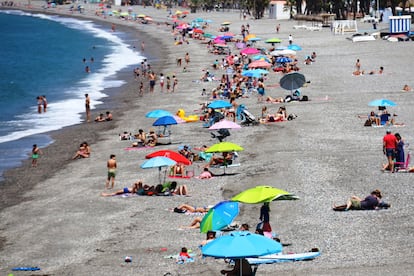Regions under Phase 3 of coronavirus deescalation will allow free movement from Monday
Andalusia and the Basque Country confirmed on Saturday that journeys between their provinces will be permitted, while some areas will hold back on that change

The regional governments of Andalusia, Aragón, Asturias, the Balearic Islands, the Canary Islands, Cantabria, Galicia, Murcia, Navarre, the Basque Country and La Rioja, as well as the North African exclave city of Melilla, will all be able to allow free movement within their entire territories from Monday, once they enter Phase 3 of the central government’s coronavirus deescalation plan. That’s according to the Official State Gazette (BOE) published today, and which contains the details of the next steps that will come into force in a couple of days.
Andalusia and the Basque Country announced on Saturday that they will permit their residents to move freely between provinces. The Andalusian premier, Juan Manuel Moreno, warned, however, that he would “respond forcefully” should there be any new outbreaks of the crisis. “If the restriction of movement is needed in the future, we will do it,” he said this weekend, Eva Sáiz reports.
Galicia, Aragón, and the Balearic and Canary Islands had already stated that free movement would be permitted once in Phase 3.
The health department in the Extremadura region, meanwhile, has said that it will wait at least a week until it calls for free movement between its provinces, Cáceres and Badajoz, given that while it has few coronavirus cases, the origins of these vary in the two areas.
“We will see how the first week goes in Phase 3 in order to open [the provinces],” said Extremadura health chief José María Vergeles. “We need half the incubation period [of the coronavirus] to do so.”
In Castilla-La Mancha, two provinces – Cuenca and Guadalajara – will be considered a single healthcare area, opening the way for free movement between them from Monday.
Asturias, Cantabria, La Rioja, Murcia and Navarre have just one province, meaning residents could already move freely within these regions.
Mobility between regions will still not be permitted until at least the state of alarm is over, on June 22. The emergency measures were implemented by the government on March 14 in a bid to slow the spread of the coronavirus, and have been renewed by the Congress of Deputies on a two-weekly basis since then. The central government has committed to leaving the last stage of the deescalation process in the hands of each region.
Phase 3 request
Madrid will enter Phase 2 of the government’s deescalation plan on Monday, but health chief Enrique Ruiz Escudero stated on Saturday that the region will request to move to Phase 3 in one week, instead of the two weeks set out by the central administration, should the progress of the epidemic continue to be positive.
He explained that if the number of intensive care unit beds occupied by coronavirus patients continued to fall in the region, which has been the worst hit by the crisis, and if the detection of cases by primary healthcare centers also descended, the request would be made.
Infected passenger
All of the passengers who were on a flight last week from Madrid to Lanzarote have tested negative for Covid-19, after it emerged that a man on the plane had taken the journey despite knowing that he was infected with the coronavirus, news agency EFE reports. The regional health department in the Canary Islands reported today that a total of 57 tests had been carried out in relation with the incident, and that all of the results came back negative.
The passenger in question was returning to Lanzarote on May 29 after having visited Ciudad Real on mainland Spain, where he was in contact with a person who had been infected with the coronavirus. Two days before returning to his residence in Lanzarote, he took a PCR test and received a call from his sister once he had already boarded the flight to tell him that the result had come back positive.
The local authorities got in touch with their counterparts in the Canary Islands, and isolation measures and tests were carried out on the infected man and 13 people who were sat near to him on the flight. Given the concerns of other passengers on the flight, a total of 57 people were tested in the end.
Although all of the tests came back negative, the 14 people who have been isolated will have to continue in quarantine for another week in order to comply with protocols.
English version by Simon Hunter.
Tu suscripción se está usando en otro dispositivo
¿Quieres añadir otro usuario a tu suscripción?
Si continúas leyendo en este dispositivo, no se podrá leer en el otro.
FlechaTu suscripción se está usando en otro dispositivo y solo puedes acceder a EL PAÍS desde un dispositivo a la vez.
Si quieres compartir tu cuenta, cambia tu suscripción a la modalidad Premium, así podrás añadir otro usuario. Cada uno accederá con su propia cuenta de email, lo que os permitirá personalizar vuestra experiencia en EL PAÍS.
¿Tienes una suscripción de empresa? Accede aquí para contratar más cuentas.
En el caso de no saber quién está usando tu cuenta, te recomendamos cambiar tu contraseña aquí.
Si decides continuar compartiendo tu cuenta, este mensaje se mostrará en tu dispositivo y en el de la otra persona que está usando tu cuenta de forma indefinida, afectando a tu experiencia de lectura. Puedes consultar aquí los términos y condiciones de la suscripción digital.









































